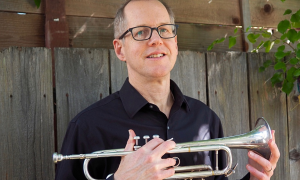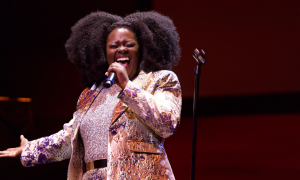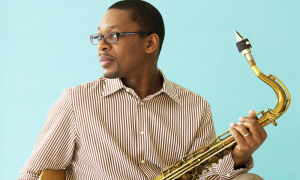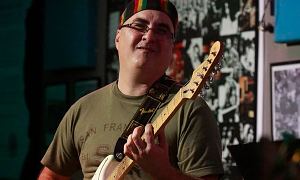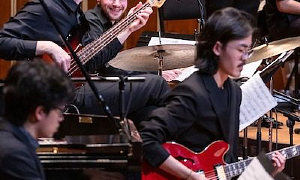Trumpeter Donald Byrd first came to New York from Detroit in 1955, when he was 22. While studying for a master's degree at the Manhattan School of Music, Byrd played in pianist George Wallington's quintet at the Cafe Bohemia. In the late 1950s, Byrd recorded five hard-bop albums with alto saxophonist Gigi Gryce before signing with Blue Note in 1958. The label wisely paired Byrd with baritone saxophonist Pepper Adams for a series of high-energy albums, most notably Off to the Races and By rd in Hand,which featured three originals by Byrd.
Byrd's next album after By rd in Hand was Fuego, recorded in October 1959. Byrd used a B-flat piccolo trumpet and was joined by Jackie McLean (as), Duke Pearson (p), Doug Watkins (b) and Lex Humphries (d)—a sensational group. All of the songs on the album were by Byrd and all are exquisite. I'm not sure why Byrd chose to use what was commonly called a pocket trumpet on the session. The compact instrument had the same range as a trumpet but with a slightly more taut tone.
The music here has a funk-Latin feel, with a savory hard-bop energy and bluesy mood. McLean's drive and yearning wails on alto sax are perfectly paired wtih Byrd's bending trumpet notes. McLean is in top form, akin to his blowing on Freddie Redd's Music From 'The Connection,' recorded in 1960. This comparison is particularly apt on Byrd's Lament, Low Life and Bup a Loup.
All of Byrd's songs here are complex, which means the group was given ample rehearsal time by producer and Blue Note owner Alfred Lion. What's more, the rhythm section was terrific. Duke Pearson's lyrical, percussive piano unites Byrd and McLean neatly, while Watkins on bass and Humphries on drums fit together like a glove. This is a perfect, must-own album.
Given all of the trumpet greats in the late 1950s and 1960s—including Miles Davis, Freddie Hubbard, Lee Morgan, Dizzy Gillespie, Blue Mitchell, Idrees Sulieman and Howard McGhee to name a handful—Byrd's star seems to be fading. There aren't many tributes, and his name comes up less frequently now in discussions.The truth is Byrd was a terrific, soulful player and an extraordinary composer. He also had a terrific fusion career starting in the late 1960s that lasted throughout the '70s. More on that phase in a later post.
Donald Byrd died in 2013.
JazzWax clip: Here's Lament. Listen how the rhythm section creates a beautiful webbed texture under Byrd's trumpet and McLean's also sax...
Byrd's next album after By rd in Hand was Fuego, recorded in October 1959. Byrd used a B-flat piccolo trumpet and was joined by Jackie McLean (as), Duke Pearson (p), Doug Watkins (b) and Lex Humphries (d)—a sensational group. All of the songs on the album were by Byrd and all are exquisite. I'm not sure why Byrd chose to use what was commonly called a pocket trumpet on the session. The compact instrument had the same range as a trumpet but with a slightly more taut tone.
The music here has a funk-Latin feel, with a savory hard-bop energy and bluesy mood. McLean's drive and yearning wails on alto sax are perfectly paired wtih Byrd's bending trumpet notes. McLean is in top form, akin to his blowing on Freddie Redd's Music From 'The Connection,' recorded in 1960. This comparison is particularly apt on Byrd's Lament, Low Life and Bup a Loup.
All of Byrd's songs here are complex, which means the group was given ample rehearsal time by producer and Blue Note owner Alfred Lion. What's more, the rhythm section was terrific. Duke Pearson's lyrical, percussive piano unites Byrd and McLean neatly, while Watkins on bass and Humphries on drums fit together like a glove. This is a perfect, must-own album.
Given all of the trumpet greats in the late 1950s and 1960s—including Miles Davis, Freddie Hubbard, Lee Morgan, Dizzy Gillespie, Blue Mitchell, Idrees Sulieman and Howard McGhee to name a handful—Byrd's star seems to be fading. There aren't many tributes, and his name comes up less frequently now in discussions.The truth is Byrd was a terrific, soulful player and an extraordinary composer. He also had a terrific fusion career starting in the late 1960s that lasted throughout the '70s. More on that phase in a later post.
Donald Byrd died in 2013.
JazzWax clip: Here's Lament. Listen how the rhythm section creates a beautiful webbed texture under Byrd's trumpet and McLean's also sax...
This story appears courtesy of JazzWax by Marc Myers.
Copyright © 2024. All rights reserved.













